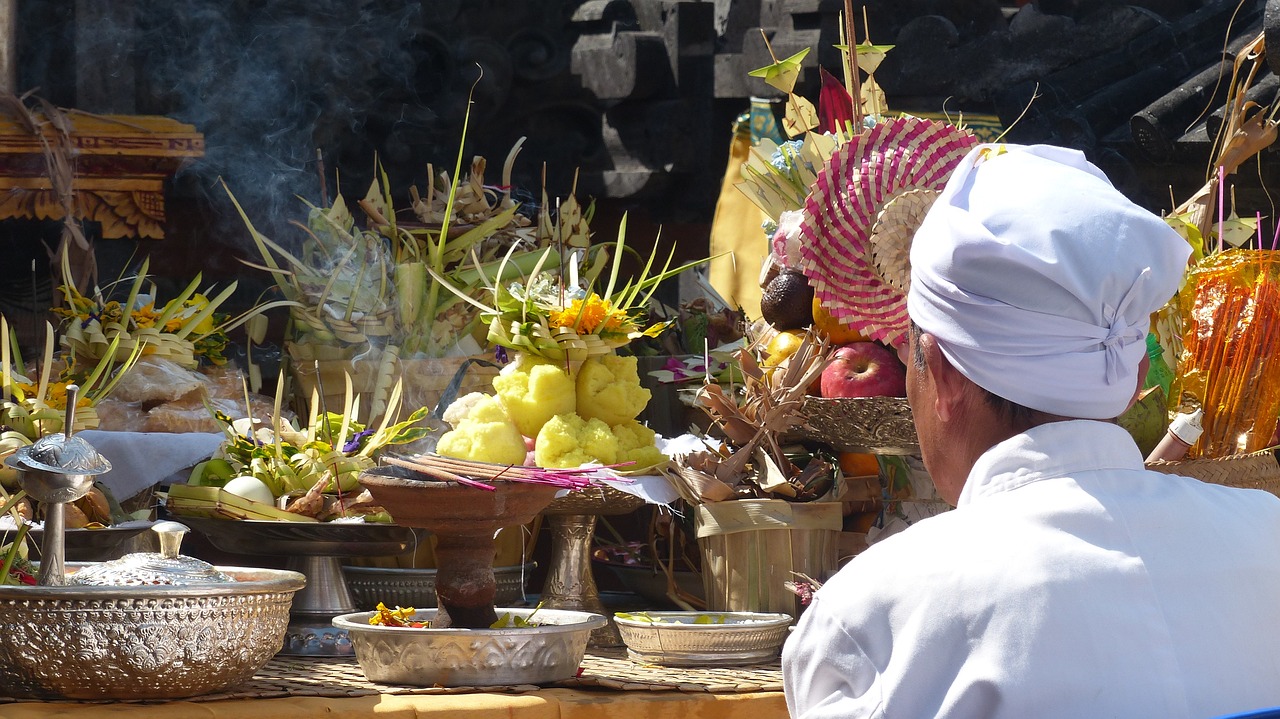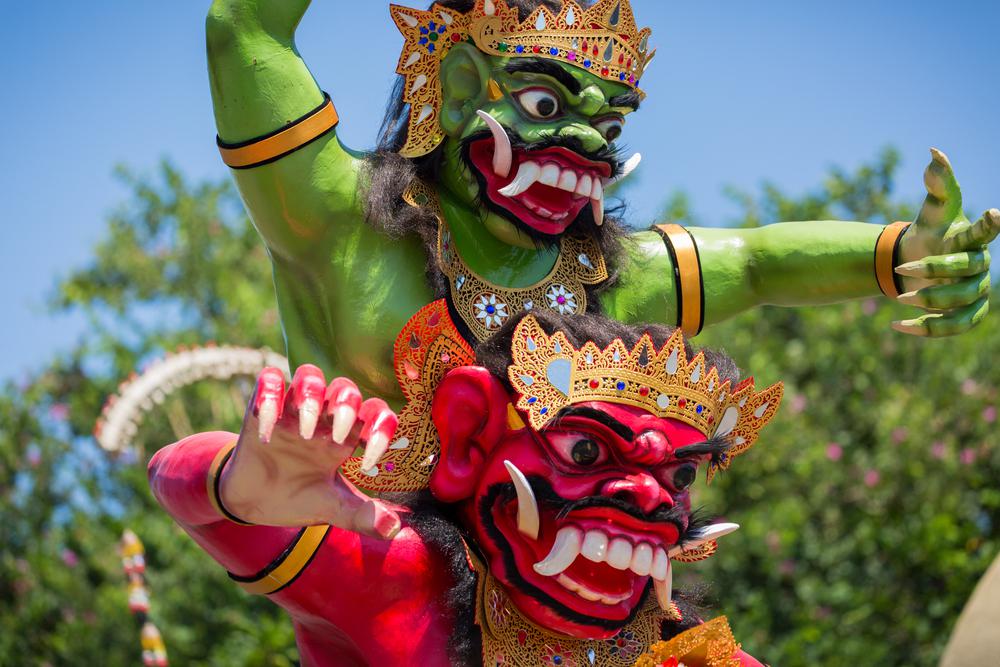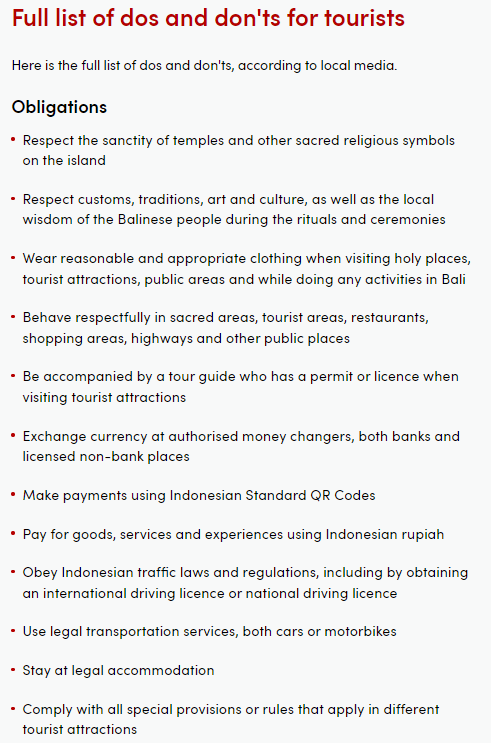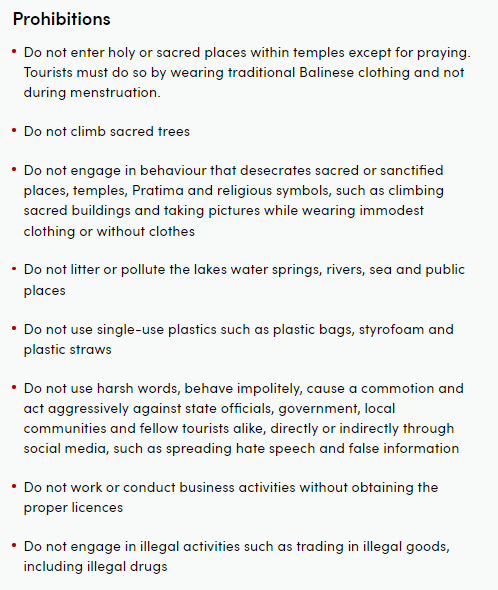Exploring the enchanting island of Bali is a dream for many travellers seeking vibrant culture, stunning landscapes, and warm hospitality. As you embark on your Bali adventure, it is crucial to familiarise yourself with the local rules and etiquette to ensure a respectful and harmonious experience.
Listed below are some essential rules and etiquettes to follow when visiting Bali, allowing you to immerse yourself in the island’s rich heritage with grace and respect. Whether it’s dressing modestly, engaging in temple etiquette, or embracing Balinese customs, these guidelines will help you navigate the beautiful tapestry of Balinese culture, ensuring a memorable and culturally sensitive journey through the Island of the Gods.
1) Dress Modestly
 Image from thebalisun.com
Image from thebalisun.com
Bali being primarily a Hindu island, modest attire is usually preferred, especially when visiting temples or other sacred places. When in public places, cover your shoulders, wear clothing that reaches your knees, and stay away from clothing that is too revealing.
2) Temple Etiquette
 Image by Anastasia from Pixabay
Image by Anastasia from Pixabay
Dress appropriately when visiting temples by donning a sarong or a typical Balinese sash (called a selendang). Respect the sacred spaces and adhere to the staff’s instructions. Do not climb on buildings or touch religious objects without permission.
3) Balinese Hindu Customs
 Image by Muhamad Ikhsan from Pixabay
Image by Muhamad Ikhsan from Pixabay
Hindu traditions and customs are deeply ingrained in the lives of Balinese people. Respect them by observing their rituals and ceremonies from a distance. Be respectful and refrain from interfering with or disturbing those taking part in a religious procession or ceremony if you happen to come across one.
Additionally, if you are invited to any traditional or religious ceremony in Bali, try your best to attend. If needed, cancel any plans if possible. If you are invited, it means that you are precious to them and they really would like you to join in. You are not allowed to leave in the middle of an event as it may be seen as being impolite.
4) Greetings and Politeness
 Image from dailymail.co.uk
Image from dailymail.co.uk
People from Bali are known for their generous hospitality. Smile and say the traditional Balinese greeting “Om Swastiastu” (pronounced “om-swa-stee-astu”) to locals. When interacting with locals, use “thank you” (“terima kasih”) and “please” (“tolong”).
Tourists are also cautioned against acting disrespectfully, rudely, loudly, or violently toward officials, residents, or other tourists.
5) Respecting Sacred Sites
 Image by jo vanel from Pixabay
Image by jo vanel from Pixabay
Bali is home to numerous holy places, including temples, shrines, and holy springs. Avoid inappropriate behavior, such as climbing on statues or stepping on offerings, and treat these places with respect. Observe any specific guidelines or directions given by temple staff.
Tourist will be ban from entering if they are caught desecrating temples, religious symbols or holy objects, including taking nude photos.
6) Cultural Sensitivity
 Image by Michal Jarmoluk from Pixabay
Image by Michal Jarmoluk from Pixabay
The culture of Bali is rich and diverse. Respect regional traditions and customs. Avoid showing affection in public, especially in rural areas. Before taking pictures of people, especially during ceremonies or in more remote communities, get their consent.
7) Environmental Consciousness
Bali’s natural beauty is a precious resource. Help preserve the environment by practicing responsible tourism. Dispose of trash properly, reduce plastic waste, and be mindful of your impact on the ecosystem.
8) Bargaining
 Image from goglobaltoday.com
Image from goglobaltoday.com
In Bali, bargaining is typical in markets and some stores. But remember to do it politely and with a smile. It’s important to find a fair price that benefits both parties because, as you should keep in mind, the Balinese are dependent on tourism for their way of life.
9) Dining with Balinese People
 Image from thehoneycombers.com
Image from thehoneycombers.com
Accept the food and drinks given by the host even though you are not hungry or thirsty. It is also strongly discouraged to eat with the left hand as it will offend the Balinese people. Guests who are tourists or business associates are recommended to try eating with their right hand, even if they are left-handed.
10) Check the Calendar of Bali for Any Big Celebrations or Ceremony
 Image from villabossibali.com
Image from villabossibali.com
Nyepi, also known as Bali’s Day of Silence, is a significant holiday in Balinese Hinduism. Every recreation area is closed on Nyepi Day. People are not permitted to turn on the light or to leave their homes. It is strongly advised that you abide by all rules if you are in Bali on Nyepi Day.
There are customary police patrolling in Bali on Nyepi Day. If you stay in your house or room, you may turn the light on and watch TV but you have to make sure you are the only person who sees the light on and the TV volume should be kept low. Close the window so that the light of the lamp in your room is not seen by outside.
Additional Rules:
Tourist are advised to follow traffic rules, abstain from drug and alcohol usage, only use authorized tour operators and lodging, and avoid working or conducting business illegally.
Refer to the list below for more details.


Adapted from channelnewsasia
Tourists who break the rules could face legal consequences under Indonesian law. The circular above will be handed out to tourists upon arrival and attached to their passports. It contains 16 rules that aim to preserve Bali’s culture, environment, and security.
By following these rules and etiquettes, you can show respect for Balinese culture, engage in meaningful interactions with locals, and contribute to a positive and enjoyable experience during your visit to Bali.


 Image by
Image by 


